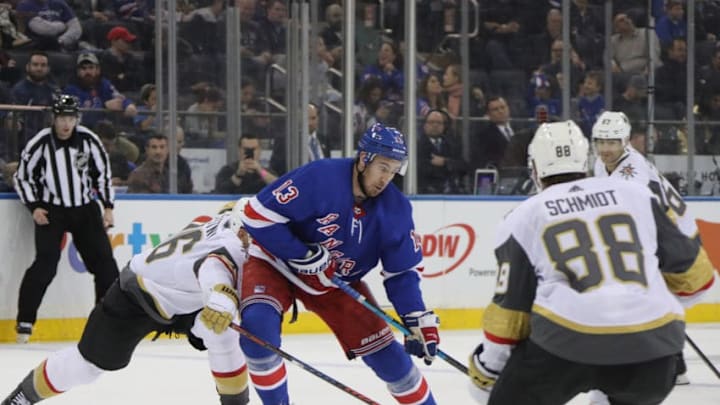
After signing a bridge deal this past summer to avoid arbitration all signs pointed to the New York Rangers trading center Kevin Hayes before the deadline. I believe that would be a mistake.
Sometimes, all it takes is the right coach to put a player in a position to succeed. For Kevin Hayes, David Quinn is the coach that finally molds him into the player he was always capable of being. Thus far in the 2018-2019 season, the Boston College product has registered 26 points in 32 games and is on pace for a career year in offensive production.
At 26, soon to be 27-years-old, the Boston native is reaching the prime of his career. Couple the maturity factor with being put in a position to succeed from a new head coach and it makes plenty of sense that the player who once recorded 45 points as a rookie would finally break out. It was four years ago that Hayes made his debut on the President’s trophy winning Rangers’ team.
In that season, the then 22-year-old played as a depth scoring option alongside proven veterans like Martin St. Louis and Carl Hagelin. On that Rangers’ team, Hayes was depth scoring in a third line role. In fact, he started 60 percent of the time in the offensive zone. That would change the following year and subsequent seasons to follow.
After the President’s Trophy-winning season, the Rangers’ then head coach Alain Vigneault embarked on a mission to covert Hayes into a two-way center capable of starting a majority of the time in the defensive zone. It took about a season and a half of trial and error from the 6’5 center, but over time he managed to seize the opportunity.
The organization was so confident in Hayes’ ability that it felt comfortable enough to trade Derek Stepan for a top ten draft pick and prospect Tony DeAngelo. If New York’s front office was not certain of Hayes’ ability to assume the heavy defensive minutes of Stepan, it would have had to make another move to free up cap space to sign defenseman Kevin Shattenkirk.
In the two years since the Stepan trade, there is a legitimate argument that Hayes was the best player on the team not named Henrik Lundqvist. This premise brings us to the debate topic today: Should the Rangers trade Hayes?
Bad business
Based on the last paragraph alone, I’m hesitant to entertain any scenario in which the Rangers’ front office trades away one of, if not its best forwards to kick the rebuilding can further down the road. As the first two and a half months of the season have proved, prospect development is not linear and takes time.
Sure, both Filip Chytil and Lias Andersson will both likely continue to improve over time. Since both are in their first full season, there’s plenty of opportunities still to come in their respective careers to get better. That’s where the argument for trading Hayes does not make a ton of sense to me.
Right now, Hayes is a better player than about 90 percent of the Rangers’ roster. At age 26, he still has plenty of productive years left in his career. The Boston native does not play a particularly brutal style, so he doesn’t have a terrible number of miles on his odometer as a player.
I’m knocking on wood as I say this, but Hayes has never played fewer than 76 games as a member of the Rangers and his style will likely remain conducive to that. However, the bigger factor at hand is the difficulty of drafting well and developing a player to the highest level.
There is no assurance that whatever assets the Rangers’ front office can get in exchange for Hayes will ever play up to the level he did. It’s a crap shoot and one based on the hope that the team can draft well. Although the front office has improved its drafting ability over time, there is no guarantee that any player will ever become anything.
Trading one of the team’s best players to acquire more prospects doesn’t make a whole lot of sense to me. The center is going to need a pay raise this offseason and likely a no-movement clause of some kind to go with it, but Hayes has earned it. In pretty much every season as a pro, the organization has asked him to do something else and he’s accomplished it.
The Ramifications
The most immediate impact of not trading Hayes would be tying up money for the long term. Since New York only has seven players under contract going into the 2020-2021 season, four of which are players on entry-level deals. A potential Hayes extension would not be a major financial problem for the team as several contracts are due to come off the books in the next few years.
The one issue that may come from not trading Hayes is a continuing of the logjam at center. Right now, the team is forced to play Fillip Chytil on the wing instead of his natural position because of the number of centers currently on the roster. With Hayes, Mika Zibanejad, Brett Howden and Andersson all in the mix, the coaching staff juggles a lot at once.
However, trading Hayes to open up a center role for one of the prospects sounds illogical. Why would the front office trade away one of its best players to open up a lineup spot in the hopes one of the prospects can one day develop to a level that they could produce as well as Hayes did.
The Rangers aren’t too far away from being a contender again, but trading Hayes away would slow down that timeline considerably. New York should keep the Boston native and give him a raise for his production.
